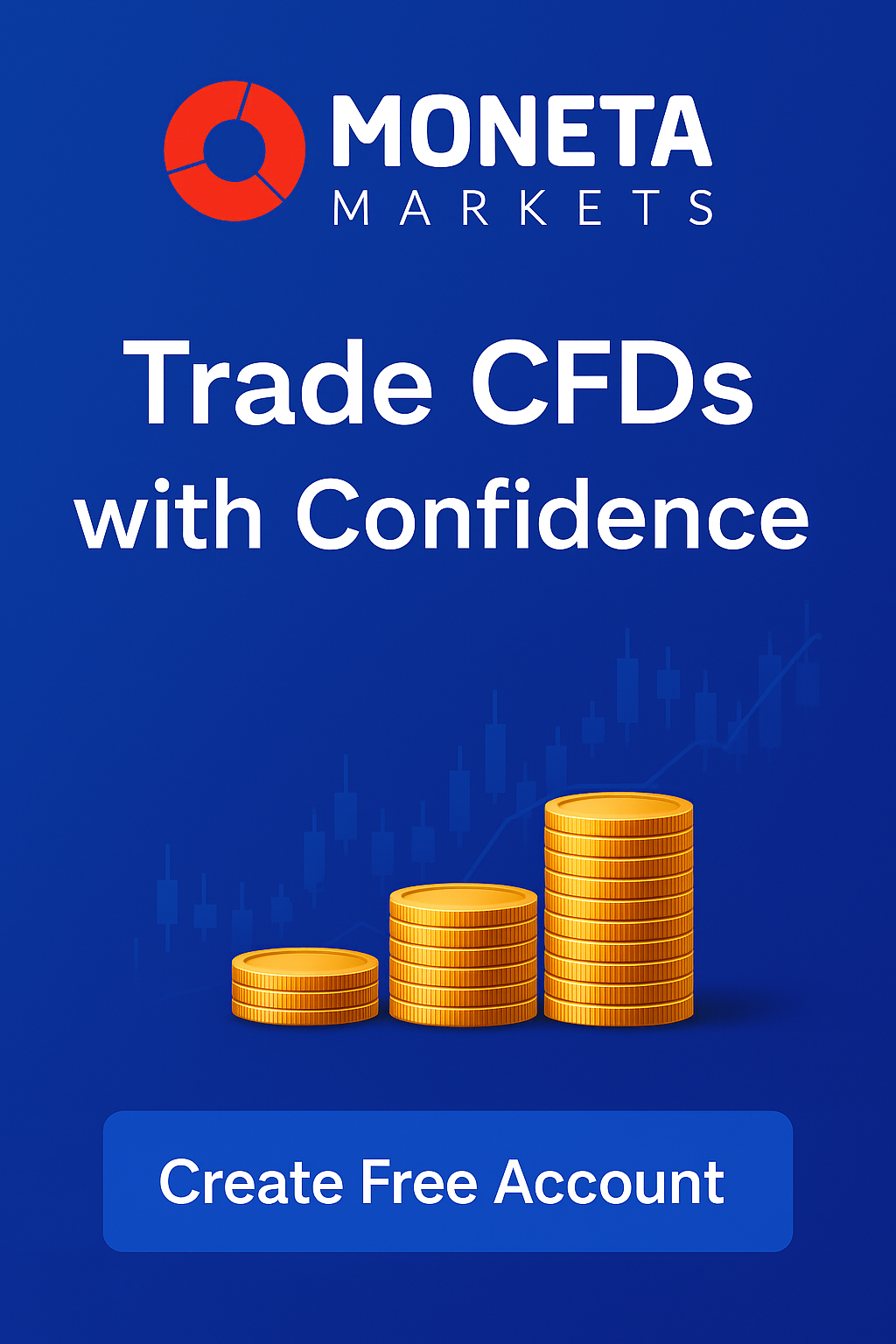The Best CFD Trading Platforms for 2025: Your Comprehensive Comparison Guide
Just got your paycheck and feeling inspired by all the U.S. stock market news, but also a bit confused by the fluctuations? Many Taiwanese investors are in the same boat, eager to explore global markets. How do you get started with U.S. stocks, and which trading platforms are reliable and beginner-friendly? This article aims to solve these very problems, guiding you through the world of CFD trading and helping you find the best platform for your needs.
We’ll cover everything from understanding what CFDs are to choosing a platform that fits your trading style and budget. Let’s dive in and make your investment journey smoother and more informed. We will equip you with the knowledge to make smart investment decisions.
Understanding CFDs: What They Are & Why Your Platform Matters
Contracts for Difference (CFDs) are agreements to exchange the difference in the value of an asset between the time the contract opens and closes. This allows traders to speculate on price movements without owning the underlying asset. CFDs offer flexibility and leverage, but also come with inherent risks.

What is a Contract for Difference (CFD)?
A CFD is essentially a contract between a buyer and a seller. They agree to exchange the difference in the price of an asset from when the contract is opened to when it’s closed. Think of it like betting on whether a stock price will go up or down.
For example, if you believe TSMC stock will rise, you can open a CFD position. If the price goes up, you profit from the difference; if it goes down, you incur a loss. This contrasts with traditional stock investing, where you own the stock directly.
The Core Advantages and Disadvantages of CFD Trading
CFD trading offers several advantages, including leverage and the ability to trade in both rising and falling markets. Leverage allows you to control a larger position with a smaller amount of capital. This can amplify profits, but also losses.
However, CFDs also have disadvantages. One common beginner mistake is not understanding the impact of leverage. Always manage your risk carefully and use stop-loss orders to limit potential losses. Remember that losses can quickly accumulate if the market moves against you.
Why Choosing the Right Platform is Crucial for Success
The right CFD trading platform can significantly impact your trading experience and profitability. A good platform offers competitive pricing, a user-friendly interface, and reliable execution.
Consider platforms with robust risk management tools, educational resources, and responsive customer support. Look for platforms that offer a demo account to practice trading strategies without risking real money. Choosing wisely can save you time, money, and frustration.
Top CFD Trading Platforms for 2025: Our Expert Selections
Finding the best CFD trading platform for your needs involves careful research and consideration of several factors. We’ve compiled a list of top platforms for 2025 based on factors like fees, user experience, and available trading tools.

Overall Best: [Top-Rated Platform]
[Top-Rated Platform] consistently ranks high for its comprehensive features and reliable service. It offers a wide range of CFDs, competitive spreads, and an intuitive trading interface. Many traders appreciate its advanced charting tools and real-time news feeds.
[Top-Rated Platform] also provides excellent customer support, making it a solid choice for both beginners and experienced traders. Its robust security measures and regulatory compliance provide peace of mind. This platform offers a seamless trading experience overall.
Best for Competitive Spreads & Fees: [Cost-Effective Platform]
[Cost-Effective Platform] is known for its low spreads and transparent fee structure. This makes it an attractive option for traders who are particularly sensitive to costs. Its cost-effectiveness doesn’t compromise on essential trading features.
For example, it offers access to a variety of markets and trading instruments. This platform is a great option for active traders looking to minimize their trading expenses. Make sure to compare the fine print and any inactivity fees.
Excellent for Beginners & Social Trading: [User-Friendly Platform]
[User-Friendly Platform] stands out for its beginner-friendly interface and robust social trading features. This allows new traders to learn from experienced investors and copy their trading strategies. It’s a great way to ease into CFD trading.
Moreover, [User-Friendly Platform] offers a wealth of educational resources, including tutorials and webinars. For those starting out, this platform provides a supportive and informative trading environment. Social trading can be a great learning experience.
Essential Criteria for Selecting Your Ideal CFD Broker
Choosing a CFD broker is a critical decision that should be based on several key criteria. These include regulation, fees, trading tools, and customer support.

Regulation and Security: Protecting Your Capital
Ensure that your chosen CFD broker is regulated by a reputable financial authority. Regulatory oversight provides a layer of protection for your funds and ensures fair trading practices. Look for brokers regulated by organizations like the Financial Conduct Authority (FCA) or the Australian Securities and Investments Commission (ASIC).
A regulated broker is more likely to adhere to strict financial standards. This reduces the risk of fraud or mismanagement of your funds. Always verify the broker’s regulatory status on the regulator’s official website.
Fees, Spreads, and Commission Structures Explained
Understanding the fee structure of a CFD platform is essential for managing your trading costs. Key costs include spreads, commissions, and overnight financing fees (swaps). Spreads are the difference between the buying and selling price of an asset.
Commissions are fees charged for each trade, and overnight financing fees are charged for holding positions overnight. Compare these costs across different platforms to find the most cost-effective option for your trading style. Lower fees mean more profit potential.
Platform Features, Trading Tools, and Usability
The trading platform should offer a range of features and tools to support your trading strategies. Look for advanced charting capabilities, real-time market data, and order management tools. Usability is also crucial – the platform should be intuitive and easy to navigate.
For example, consider whether the platform offers mobile trading apps for trading on the go. A well-designed platform can enhance your trading experience and improve your decision-making. A cluttered interface can lead to costly mistakes.
Tailoring Your Choice: Best CFD Platforms for Specific Needs
Different traders have different needs, and some CFD platforms excel in specific areas. Whether you’re a beginner, prefer mobile trading, or focus on crypto CFDs, there’s a platform tailored for you.

Best for Beginners: User-Friendly Platforms with Educational Resources
For beginners, a user-friendly platform with comprehensive educational resources is essential. These platforms often offer tutorials, demo accounts, and dedicated customer support. They help new traders learn the ropes without risking real money.
Look for platforms that provide step-by-step guides and glossaries of trading terms. Many offer webinars and interactive courses to enhance your knowledge. Knowledge is power in the trading world.
Top Platforms for Mobile Trading on the Go
Mobile trading platforms allow you to manage your positions and trade on the go. These platforms offer a convenient way to stay connected to the markets. Look for platforms with well-designed mobile apps that offer all the features of the desktop version.
A good mobile trading app should have a user-friendly interface and reliable performance. It’s crucial to have access to real-time data and order management tools. Don’t underestimate the power of trading from your smartphone.
Specialized Platforms for Crypto or Share CFDs
Some platforms specialize in specific asset classes, such as cryptocurrencies or shares. These platforms may offer a wider range of instruments and more competitive pricing within their niche. If you’re particularly interested in crypto or share CFDs, consider these specialized platforms.
For example, a crypto-focused platform might offer a variety of altcoins and advanced trading tools for crypto trading. Be sure to research the platform’s expertise and reputation in your chosen asset class. Focus on what you know best.
Navigating the Risks and Costs of CFD Trading
CFD trading involves significant risks, and it’s important to understand these before you start trading. Leverage, margin calls, and various costs can impact your profitability. Risk management is paramount.
The Double-Edged Sword of Leverage: Amplifying Gains and Losses
Leverage allows you to control a larger position with a smaller amount of capital. While this can amplify your profits, it can also amplify your losses. Use leverage cautiously and always set stop-loss orders to limit your risk.
One common mistake is over-leveraging your account. This can lead to rapid losses if the market moves against you. Understand the risks associated with leverage before you start trading.
Understanding Spreads, Swaps, and Overnight Financing Fees
CFD trading involves various costs, including spreads, swaps, and overnight financing fees. Spreads are the difference between the buying and selling price. Swaps are fees charged for holding positions overnight.
Overnight financing fees are charged for borrowing funds to maintain your position. Be aware of these costs and factor them into your trading strategies. Small costs can add up over time.
Essential Risk Management Strategies for CFD Traders
Effective risk management is crucial for CFD traders. Use stop-loss orders to limit potential losses. Diversify your portfolio to reduce your exposure to any single asset. Only risk what you can afford to lose.
Another key strategy is to monitor your positions regularly. Stay informed about market news and events that could impact your trades. Knowledge and vigilance are key to successful trading.
Regulatory Landscape: Where are CFDs Legal (and Not)?
The regulatory landscape for CFDs varies significantly around the world. Some countries have strict regulations, while others have banned CFDs altogether. It’s important to be aware of the regulatory environment in your region.
Global CFD Regulation: What to Look For in a Broker
Look for CFD brokers that are regulated by reputable financial authorities. These authorities enforce strict standards and provide a level of protection for your funds. Regulatory oversight ensures fair trading practices.
Consider brokers regulated by the FCA in the UK or ASIC in Australia. A regulated broker is more likely to adhere to high ethical standards. Always check the broker’s regulatory status.
Are CFDs Legal in the US? Important Restrictions to Know
CFD trading is generally not legal in the United States for retail investors. This is due to regulatory restrictions imposed by the Commodity Futures Trading Commission (CFTC) and the Securities and Exchange Commission (SEC). U.S. residents typically cannot trade CFDs with brokers based in the U.S.
There may be limited exceptions for certain types of investors or specific products. However, for the vast majority of retail traders, CFDs are not an option in the US. This is a key consideration for international traders.
The Importance of Licensed and Reputable CFD Brokers
Choosing a licensed and reputable CFD broker is crucial for protecting your capital. A licensed broker is subject to regulatory oversight and must meet certain financial standards. A reputable broker has a proven track record of fair trading practices.
Research the broker’s history and read reviews from other traders. Avoid brokers with a history of complaints or regulatory violations. Your peace of mind is worth the extra effort.
Ready to elevate your trading strategy? Explore our detailed reviews of the top CFD trading platforms and start your journey with a platform that truly fits your needs. Join our community for more resources!


No responses yet